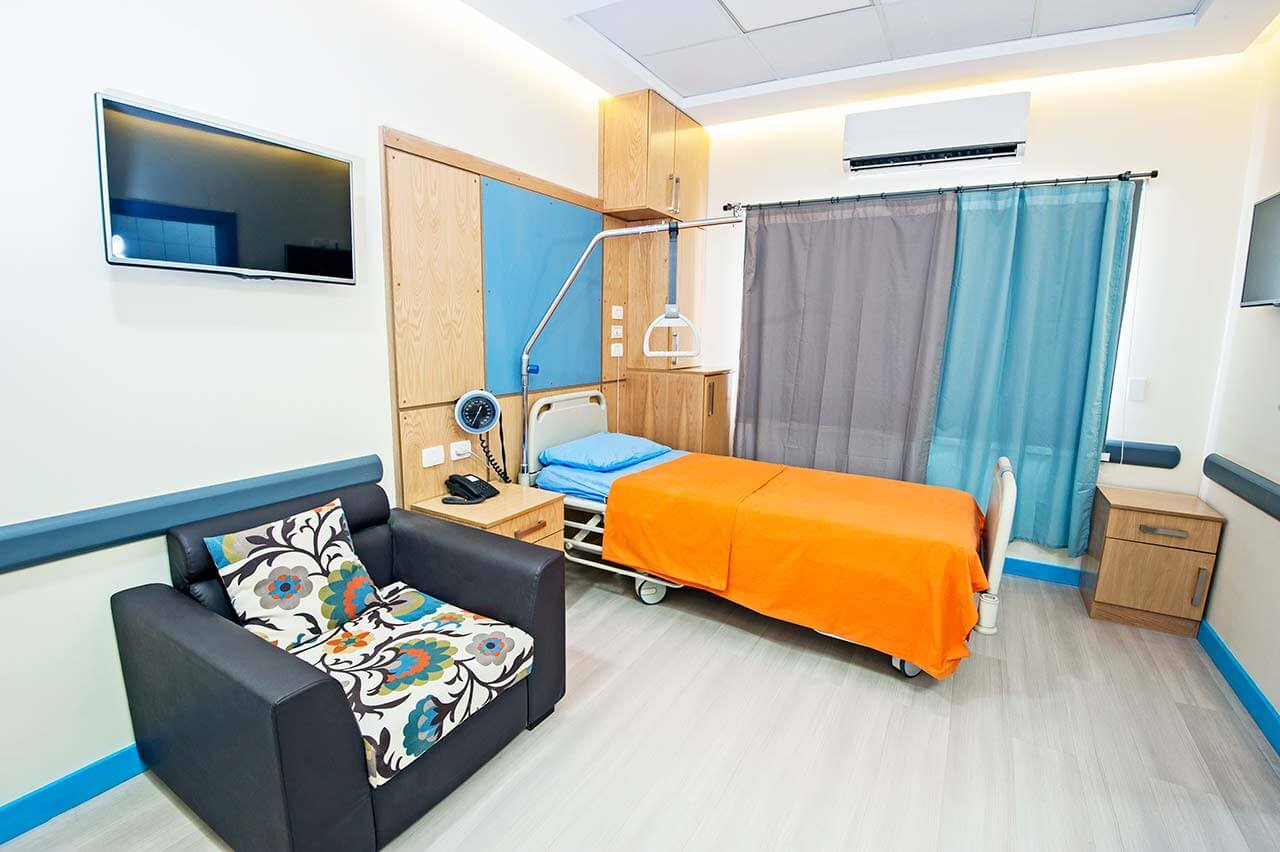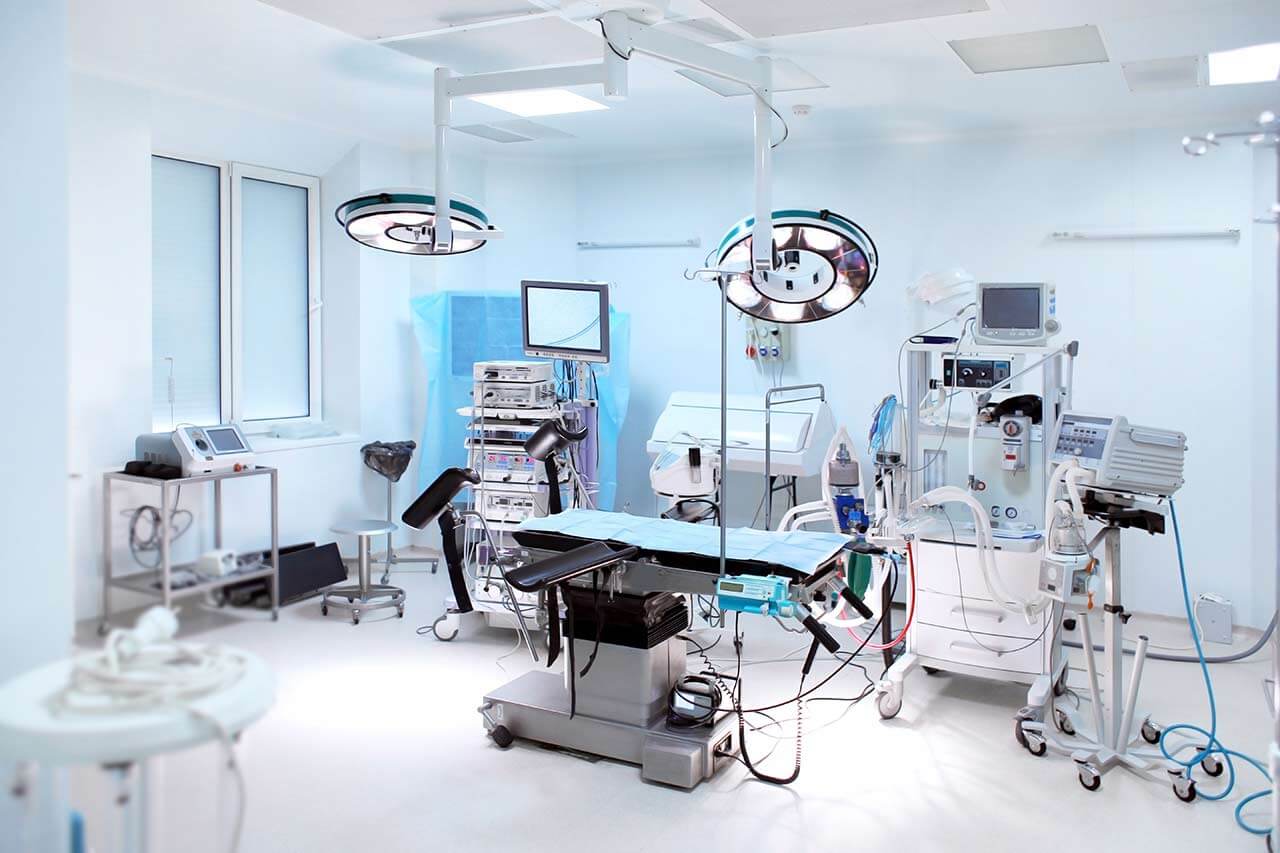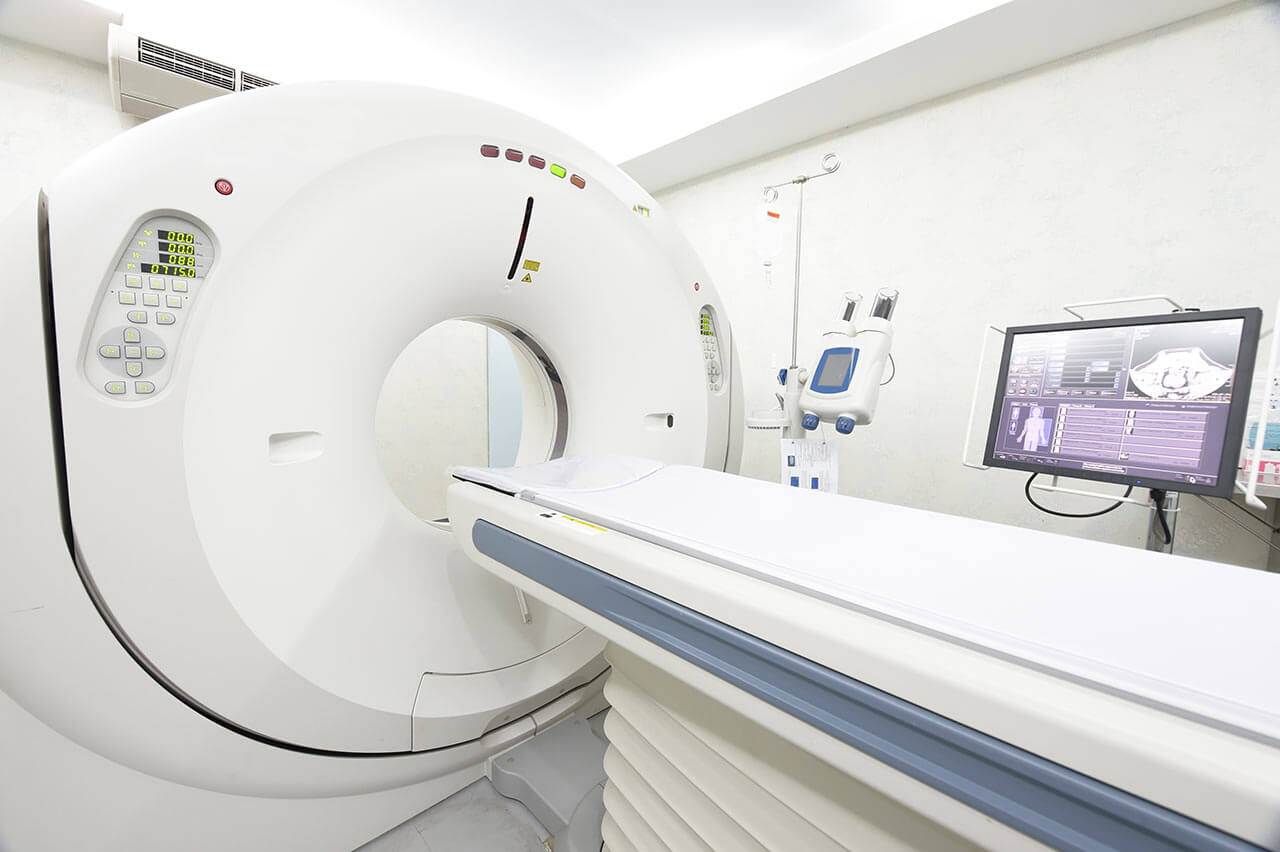
The program includes:
- Initial presentation in the clinic
- clinical history taking
- review of medical records
- physical examination
- laboratory tests:
- complete blood count
- biochemical analysis of blood
- inflammation indicators (CRP, ESR)
- TSH-basal, fT3, fT4
- indicators of blood coagulation
- CT-planning of radiation therapy
- full course of radiation therapy
- individual plan of the chemotherapy
(the cost of medicines is included) - symptomatic treatment
- cost of essential medicines and materials
- nursing services
- control examinations
- consultations of related specialists
How program is carried out
During the first visit, the doctor will conduct a clinical examination and go through the results of previous laboratory tests and instrumental examinations. After that, you will undergo an additional examination, including complete blood count, laboratory assessment of liver and kidney function. Based on the received results, the physician will elaborate the chemotherapy regimen, conduct radiotherapy planning with the help of CT or MRI, make the permanent tattoo marks on the skin and conduct CT simulation in order to assess the accuracy of the rays and the radiation dose. If necessary, related medical specialists will be involved in the elaboration of a treatment regimen (tumor board).
Chemotherapy and radiation therapy are carried out as the day hospital procedure, without mandatory admission to the hospital. At each visit, the physician will assess your general condition and the marks on the skin. After that, you will be placed in a shielded radiation therapy room, on a special table.
Each radiation therapy session lasts less than half an hour (including preparation). All this time, doctors and nurses are monitoring your condition, you can communicate with them through a loudspeaker. The procedure is completely painless. Depending on the planned course of treatment, you will visit the hospital from 1 to 3-5 times a week.
During the chemotherapy session, after the placement of a venous catheter, you will stay in a comfortable ward. An infusion system will be connected to the catheter, through which the required drug or a drug combination will be administered. All drugs are administered by intravenous drip, slowly, so the total duration of the infusion can be up to several hours. All this time, doctors and nurses will monitor your health condition closely.
After the completion of the chemotherapy and radiation therapy course, you will undergo control examinations aimed at assessing your condition and efficacy of treatment. After that you will receive the medical report with detailed recommendations regarding further follow-up and treatment. In the future, you will be able to have a distant consultation with your attending physician and schedule the next course of treatment, if necessary.
Required documents
- Medical records
- MRI/CT scan (not older than 3 months)
- Biopsy results (if available)
Service
You may also book:
 BookingHealth Price from:
BookingHealth Price from:
About the department
The Department of Oncology at the University Hospital Carl Gustav Carus Dresden offers the full range of diagnostics and drug therapy of malignant diseases. Particular attention is paid to the treatment of gastrointestinal cancers (colon, esophagus, stomach, pancreas, liver), lung cancer, connective tissue malignancies (sarcomas) and germ cell tumors. The Head Physician of the department is Prof. Dr. med. Gunnar Folprecht.
The department's doctors have in their arsenal the very latest methods of chemotherapy, immunotherapy and targeted therapy with innovative medicines. The necessary specialists from related fields are involved in the treatment planning, for example, surgeons, radiation therapists, specialists in radiology, gastroenterologists, pulmonologists and others. The patient receives individualized, comprehensive medical care at the highest level of university medicine. The treatment is carried out both on an inpatient and outpatient basis. The therapy regimen is determined individually for each patient, based on the characteristics of the disease and general health condition.
The department regularly hosts tumor boards, at which doctors consider various clinical cases and develop optimal treatment regimens. An important role in cancer treatment is also played by the close cooperation of the department with the Comprehensive Cancer Center Dresden, which is one of the five leading cancer centers in Germany certified in accordance with the standards of the German Cancer Society. Cooperation with this center provides patients with access to advanced treatment methods, the very latest types of radiation therapy and molecular diagnostics of tumors. There is also an opportunity to take part in clinical trials at the national and international level.
The department's tasks also include the provision of palliative care for patients with end-stage cancers. Physicians use all available palliative care options to relieve pain and improve the quality of life of patients. If desired, specially trained staff provide palliative care at home. In addition, psycho-oncological care is an important part of cancer treatment – competent psychologists work with patients, as they have the necessary skills to maintain a positive attitude of the patient towards a favorable treatment outcome.
The department's main areas of specialization include:
- Diagnostics and treatment of malignant gastrointestinal tumors
- Colon cancer
- Esophageal carcinoma
- Stomach cancer
- Pancreatic cancer
- Liver cancer
- Diagnostics and treatment of lung cancer
- Diagnostics and treatment of soft tissue tumors (sarcomas)
- Diagnostics and treatment of germ cell tumors
- Diagnostics and treatment of other types of cancer
The department's therapeutic options include:
- Chemotherapy
- Immunotherapy
- Targeted therapy with innovative medicines
- Palliative care (also at home)
- Psycho-oncological care
- Participation in clinical trials
- Other medical services
Photo: (с) depositphotos
About hospital
According to the reputable Focus magazine, the University Hospital Carl Gustav Carus Dresden ranks among the top five German hospitals!
The hospital is the benchmark for modern high-quality medicine. Positioning itself as a maximum care medical facility, the hospital represents all medical fields. There are 26 specialized departments, 6 institutes and 17 interdisciplinary centers, which cooperate closely with the clinical and scientific facilities of the Faculty of Medicine. The basis of successful practice is excellent equipment, which is regularly updated, as well as highly qualified, experienced medical personnel: world famous doctors and professors work here for the benefit of patients.
In addition to its main goal of caring for patients, the hospital is also active in training and professional development of medical personnel, as well as in the field of public health care. The priority focus of the work is research activity, which allows the doctors to introduce the innovative diagnostic and therapeutic techniques into clinical practice.
A special feature of the hospital is also the diagnostics and treatment of rare diseases. State-of-the-art equipment and well-coordinated work of doctors of various medical specialties make it possible to timely recognize pathologies rarely encountered in medical practice and select the most effective therapy. Specialization in rare diseases include neurology, endocrinology, hematology/oncology, and rare autoimmune diseases.
The hospital has 1,410 beds for patient hospitalization. About 55,900 inpatients and more than 233,975 outpatients undergo treatment here annually. A large medical team, consisting of about 1,000 highly qualified doctors, as well as over 2,000 nursing staff take care of the patients' health. Each patient is guaranteed an individual approach and the most effective treatment in accordance with current clinical protocols.
It should be noted that the university hospital enjoys an impeccable reputation not only in Germany, but also far beyond its borders, including Arab countries, post-Soviet states, Great Britain and the United States. Patients from different parts of the world come here for high-quality treatment for diseases of any severity. The highest credit of patient confidence is the main indicator of the fruitful work of doctors.
Photo: (с) depositphotos
Accommodation in hospital
Patients rooms
The patients of the University Hospital Carl Gustav Carus Dresden live in comfortable rooms made in bright colors and equipped with everything necessary. The standard patient room includes an automatically adjustable bed, a bedside table with a sliding table, a wardrobe, a telephone and a TV. There is also Wi-Fi (free) in the patient rooms.
If desired, patients may live in enhanced comfort patient rooms. These patient rooms have a more sophisticated design, upholstered furniture and a safe for storing valuables.
Meals and Menus
The patients of the hospital are offered a tasty, healthy and varied three meals a day. The menu is based on local cuisine and seasonal food. If you for some reason do not eat certain products, please inform the medical staff of the hospital in advance, and you will be offered an individual menu. The nutrition provided in the hospital is certified in accordance with the quality standards of the German Nutrition Society (DGE) for catering in German hospitals.
Further details
Standard rooms include:
Religion
The religious services are available upon request.
Accompanying person
Your accompanying person may stay with you in your patient room or at the hotel of your choice during the inpatient program.
Hotel
You may stay at the hotel of your choice during the outpatient program. Our managers will support you for selecting the best option.
The hospital offers a full range of laboratory diagnostic procedures (general, hormonal, tests for tumor markers, infections, antibodies, etc.), genetic tests, various modifications of ultrasound scans, CT scans, MRI and PET / CT, angiography, myelography, biopsy and other examinations. Treatment with medications, endoscopic and robotic operations, stereotaxic interventions is carried out here, modern types of radiation therapy are also used. The hospital offers patients all the necessary therapeutic techniques.
- Cochlear implantation
- Deep brain stimulation
- Treatment of benign prostatic hyperplasia with green laser
- Da Vinci prostatectomy
- Bone marrow transplantation
These are head and neck tumors, hearloss, amyotrophic lateral sclerosis, epilepsy, Parkinson disease, infertility, malignant tumors of the reproductive system, congenital anomalies of the genital organs and the urinary system, urinary incontinence, blood clotting disorders, leukemia and other pathologies.
- Otolaryngology (Center for Cochlear Implantation)
- Neurology and Epileptology
- Urology
- Oncology
- Gastroenterology and Hepatology
About 1,000 highly qualified doctors work at the hospital.





